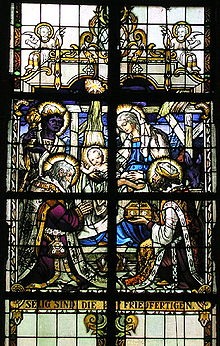- Matthew 5:9
-
Matthew 5:9 is the ninth verse of the fifth chapter of the Gospel of Matthew in the New Testament. It is the seventh verse of the Sermon on the Mount, and also seventh of what are known as the Beatitudes.
In the King James Version of the Bible the text reads:
- Blessed are the peacemakers:
- for they shall be called the children of God.
The New International Version translates the passage as:
- Blessed are the peacemakers,
- for they will be called sons of God.
For a collection of other versions see BibRef Matthew 5:9
The word peacemakers does not imply pacifism, unlike later sections of the sermon. It does not refer to those who do not fight, but those who actively bring conflict to an end. Hill notes that peacemakers is a rarely used word in the period, and that it was most commonly used to refer to Roman Emperors who had brought peace. As such this verse formed the heart of St. Augustine's argument in favour of just war, arguing that a war that brought about greater peace was justified. Clark notes that the first century was in the middle of the Pax Romana and actual wars were rare and that the verse may have referred to disputes within the community, rather than actual wars.[1] Hare agrees that this verse isn't praise of the Pax Romana, but rather a reflection that the Roman forces had not brought harmony or cooperation and that such things were impossible to impose by force.[2]
What precisely the author of Matthew was advocating in this verse is unclear. Davies and Allison note that it can be read as supporting those who are at peace with God, but they state that most scholars believe it more likely refers to those who are reconciled with other people, a theme which recurs in Matthew.[3] Boring believes this verse is a rejection of the proto-Zealots and a defence of why the Christian community did not participate in the Great Jewish Revolt.[4]
Martin Luther and other early Protestant translator's of the Bible preferred the translation "children of God," because they wanted to avoid any confusion as to whether Jesus was the only Son of God. "Sons of God" is, however, the more accurate translation and is used by most modern Bible translations. In several places the Gospel makes clear that the population in general can be called sons of God and Jesus frequently refers to God as "your Father." However, the Gospels never have him referring to God as "Our Father," asserting that the nature of the fatherhood was different for Jesus and the masses.[5][6]
Other than "blessed are the meek" in Matthew 5:5 this is perhaps the most famous of the Beatitudes. It was the personal motto of James I of England, and has been used by a number of other groups and organizations. In The Canterbury Tales "The Tale of Melibee" this verse is one of the main themes. The Beatitude is quoted three times by Shakespeare, but each times ironically. It appears a 2.1.25 of Henry VI, part 2, 2.1.50-3 of Richard III, and 5.3.138-40 of Coriolanus. The verse also plays an important role in Herman Melville's Billy Budd. This verse was famously misprinted in the second edition of the Geneva Bible as "blessed are the placemakers." This was parodied in Monty Python's Life of Brian where the crowd listening to the sermon mishears it as "blessed are the cheesemakers" and then begin to debate the meaning of the phrase.[7]
References
- ^ Hill, David. The Gospel of Matthew. Grand Rapids: Eerdmans, 1981
- ^ Hare, Douglas R. A. Matthew. Interpretation, a Bible commentary for teaching and preaching. Westminster John Knox Press, 1993 pg. 42
- ^ Davies, W.D. and Dale C. Allison, Jr. A Critical and Exegetical Commentary on the Gospel According to Saint Matthew. Edinburgh : T. & T. Clark, 1988-1997. pg 68
- ^ Boring, Eugene "Gospel of Matthew." The New Interpreter's Bible, volume 8 Abingdon, 1995 pg. 180
- ^ Schweizer, Eduard. The Good News According to Matthew. Atlanta: John Knox Press, 1975
- ^ Clarke, Howard W. The Gospel of Matthew and its Readers: A Historical Introduction to the First Gospel. Bloomington: Indiana University Press, 2003.
- ^ Twomey, M.W. "The Beatitudes." A Dictionary of Biblical Tradition in English Literature. David Lyle Jeffrey, general editor. Grand Rapids: W.B. Eerdmans, 1992.
Gospel of Matthew Preceded by:
Matthew 5:8Chapter 5 Followed by:
Matthew 5:10
Wikimedia Foundation. 2010.

